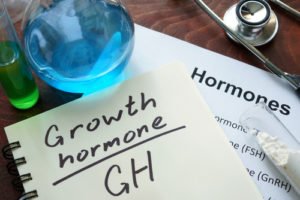
Thyroid hormone replacement therapy is not known for having significant side effects. That said, elevated levels of thyroid hormones may result in:
- Elevated heart rate
- Chest pain
- Excessive sweating
- Nervousness
- Insomnia
- Diarrhea
- Vomiting
- Headache
- Weight loss
- Fever
These symptoms often arise from toxic levels of thyroid hormones and may be avoided when therapy is conducted responsibly by a qualified medical professional.
Thyroid Hormone Replacement Therapy Can Be Very Beneficial
A thyroid that is not functioning properly, and specifically one that is producing insufficient amounts of thyroid hormones, can cause a number of serious health effects. Known as hypothyroidism, an underactive thyroid may lead to:
- Thinning hair
- Abnormal cold sensitivity
- Thin blood
- Aching muscles
- Gaining weight
- Lack of energy
- Depression
Those who qualify for thyroid hormone replacement therapy often weigh these short-term effects of hypothyroidism and choose to accept the potential side effects that sometimes arise from thyroid hormone replacement therapy. Because the thyroid plays a critical role in our body’s overall health, some see no other choice.
For a free consultation, call (305) 682-1818
The Thyroid Is Central to Our Health
The thyroid is a gland that sits under the voice box in the front of the neck. It creates and secretes several hormones, with the most noteworthy being:
- Calcitonin
- Triiodothyronine, (T3)
- Tetraiodothyronine, (T4)
Hormones play an indispensable role in our health, regulating critical functions such as metabolism, fertility, and growth. The hormones T3 and T4 control the basal metabolic rate. When elevated, these hormones produce:
- Physical body growth
- Maturation in the brain
- A faster heartbeat and pulse
- A rise in body temperature
- An alert nervous system, which heightens reflexes and concentration
The body’s ability to kick into attentiveness and produce the neurological reactions that come with that state of being, is vitally important. When hypothyroidism takes hold, this diminishes.
Hypothyroidism Is an All-Encompassing Disorder
When your thyroid fails to produce the normal amount of hormones, serious health effects set in that can lead to even more serious, long-term diseases and ailments.
The symptoms of hypothyroidism include:
- Sensitivity to cold
- Constipation
- Abnormal weight gain
- Unhealthy hair and nails
- Numbness, tingling, and pain in the extremities
- Irregular or heavy menstrual flow
- In the elderly, additional problems may arise affecting memory and possible depression
- Weak and aching muscles
- Low energy
- Muscle cramping
- The inability to move quickly
- A minimized or lost sex drive (libido)
- Dry, scaly skin
Those who do not recognize or address hypothyroidism in its early stages will likely experience increasingly serious or unsightly health consequences. Some of the long-term effects of untreated hypothyroidism include:
- A puffy face
- A hoarse or low-pitched voice
- A slowed heart rate, which may be a sign of a taxed cardiovascular system
- Anemia, which is an abnormally low amount of red blood cells
- Diminished hearing or complete hearing loss
These effects vary in their seriousness, but none of them are desirable. It is a no-brainer to treat hypothyroidism as soon as you discover it, and treatment begins with discovering the source of the hypothyroidism.
Some Possible Causes of Hypothyroidism
Abnormally low hormone levels have several potential causes. Some of the possible sources of hypothyroidism include:
Adverse Reaction to Medication
If you have started taking a new medication recently and are experiencing symptoms of hypothyroidism (fatigue, puffy face, etc.), consider that the medication could be affecting your thyroid’s normal function. Speak to your doctor if symptoms of hypothyroidism persist.
An Overcorrected Hyperthyroidism Treatment
Hyperthyroidism, the opposite effect of hypothyroidism, is an overly active thyroid, which can lead to potentially fatal health effects, such as an overtaxed cardiovascular system and dangerous weight loss. Yet sometimes treatment for hyperthyroidism can actually result in hypothyroidism.
Thyroid Surgery
If you were afflicted with cancer of the neck or head area and the cancer reached your lymph nodes, then you may have required surgery to remove part of the node. Removing part of the thyroid can cause abnormal function that qualifies as hypothyroidism. Treatment may help ease the symptoms, even though you cannot physically replace the thyroid itself.
Autoimmune Disease
Autoimmune diseases occur when the body starts attacking itself, and some autoimmune diseases take a toll on the thyroid gland. One autoimmune disease, in particular, that affects the thyroid is Hashimoto’s thyroiditis, or Hashimoto’s disease, yet it is not the only one.
Radiation Therapy
When certain forms of cancer affecting the head or neck require radiation therapy, hypothyroidism can be one of the side effects.
Click to contact our specialist today
Many With Hypothyroidism Choose Thyroid Hormone Replacement Therapy
Despite its aforementioned side effects, many weigh the health effects of hypothyroidism and choose to undergo thyroid hormone replacement therapy. This therapy includes taking synthetic thyroid hormones that work in conjunction with:
- Diet
- Lifestyle
Thyroid Hormone Replacement Therapy Aims To Restore Biological Normalcy
Thyroid hormone replacement therapy is designed to restore normal thyroid function, and in doing so, minimizing or eliminating the negative effects of hypothyroidism. The primary hormone replaced through these therapies is thyroxine (T4), which can be delivered in pill form.
A series of tests can determine the proper dosage for your thyroid hormone replacement. Blood tests show not only the amount of thyroid hormone in your blood but also the amount of thyroid-stimulating hormone (TSH). These work in conjunction to determine thyroid function, and therapy will target these entities.
Thyroid hormone replacement therapy done properly can help minimize some of the most dangerous effects of hypothyroidism, namely weight gain that is virtually impossible to reverse without intervention at the hormone level. And the side effects of thyroid hormone replacement are significantly less severe than the effects of hypothyroidism. Each case of hypothyroidism is unique, and therapy candidates should work with a medical professional to craft a treatment plan that works within their unique biology.
Complete a Free Consultation form now
Call HealthGAINS Today
The team of professionals at HealthGAINS will explain to you your viability for therapy, as well as answer any questions you might still have about the side effects of thyroid hormone replacement. Call today at (305) 912-8828 to discuss your case and how thyroid hormone replacement therapy may help you.
Call or text (305) 682-1818 or complete a Free Consultation Form








